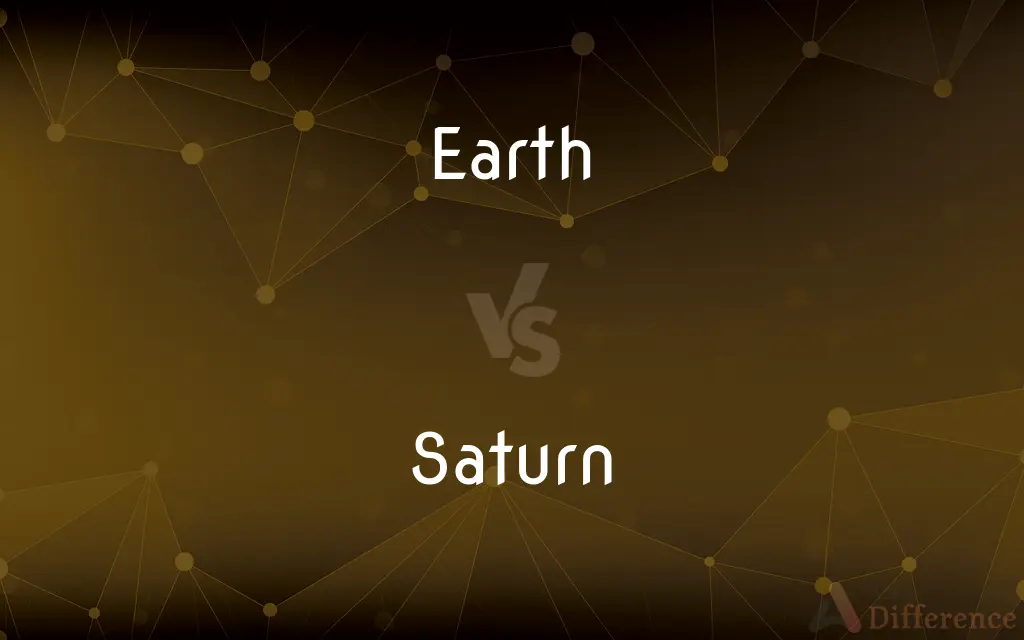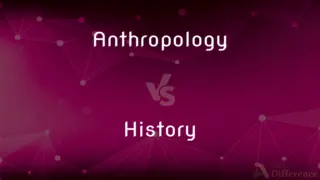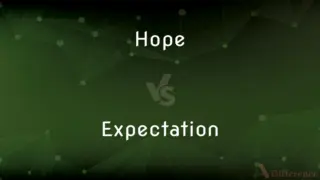Earth vs. Saturn — What's the Difference?
By Urooj Arif & Maham Liaqat — Updated on March 21, 2024
Earth is our densely populated home planet, known for its water and life, while Saturn is a gas giant famous for its extensive ring system.

Difference Between Earth and Saturn
Table of Contents
ADVERTISEMENT
Key Differences
Earth, the third planet from the Sun in our solar system, is unique among the known planets for its abundant water, diverse life forms, and complex ecosystems. Its atmosphere, primarily composed of nitrogen and oxygen, plays a crucial role in sustaining life. Saturn, on the other hand, is the sixth planet from the Sun and is characterized by its massive size, low density, and prominent ring system made of ice and rock particles.
While Earth has a solid surface with varied topography, including mountains, valleys, and oceans, Saturn is a gas giant with no definitive solid surface. Its atmosphere is primarily composed of hydrogen and helium, with a complex layering of gases and liquids beneath its clouds. Saturn's rings, not found on Earth, are among the most striking features of any planet in our solar system, visible even with small telescopes.
Earth's single moon contrasts with Saturn's numerous moons and moonlets, with over 60 confirmed satellites, including Titan, one of the most Earth-like bodies in the solar system, having a thick atmosphere and liquid on its surface. This diversity of satellites adds to the complexity and intrigue of Saturn compared to Earth.
Human presence and activity are confined to Earth, making it the center of human culture, history, and civilization. In contrast, Saturn represents a frontier for scientific exploration and study, with missions like Cassini providing detailed data about the planet, its rings, and moons, expanding our understanding of the solar system.
Despite their differences, studying planets like Saturn can offer insights into the formation of the Earth and the dynamics of the solar system, highlighting the interconnectedness of celestial bodies despite their diverse characteristics.
ADVERTISEMENT
Comparison Chart
Type
Terrestrial planet
Gas giant
Atmosphere
Nitrogen, Oxygen
Hydrogen, Helium
Surface
Solid with water bodies
No definitive solid surface
Rings
None
Extensive ring system
Moons
1 (The Moon)
Over 60, including Titan
Human Habitation
Yes, only planet known to support life
No, not suitable for human life
Notable Features
Abundant water, diverse ecosystems
Prominent rings, numerous moons
Compare with Definitions
Earth
The third planet from the Sun, uniquely hosting diverse life forms and ecosystems.
Earth's surface is 71% water, supporting a wide range of marine and terrestrial life.
Saturn
A gas giant known for its extensive ring system and numerous moons.
Saturn's rings are made up of ice and rock particles and are visible from Earth with a telescope.
Earth
Composed mainly of nitrogen and oxygen, with a protective ozone layer.
Earth's atmosphere filters harmful solar radiation, enabling life.
Saturn
Has a diverse array of moons, including Titan, which has a thick atmosphere and lakes of methane.
Titan, Saturn's largest moon, is of great interest due to its potential for prebiotic chemical processes.
Earth
Features mountains, valleys, oceans, and a dynamic climate system.
The Earth's surface undergoes continuous change due to tectonic and erosional processes.
Saturn
Dominated by hydrogen and helium, with dynamic storm systems and bands.
Saturn's atmosphere includes the Great White Spot, a massive storm system.
Earth
Studied extensively by humans, with numerous satellites and missions.
Earth observation satellites monitor climate, weather, and natural disasters.
Saturn
Lacks a true solid surface, with a possibly metallic core beneath layers of gas and liquid.
Saturn's surface is a dense atmosphere transitioning into liquid and solid layers deep within.
Earth
Home to a single natural satellite, the Moon.
Earth's Moon influences tides and has been the only extraterrestrial body visited by humans.
Saturn
Explored by spacecraft like Voyager and Cassini, providing valuable data about its rings and moons.
The Cassini mission revealed complex structures within Saturn's rings and detailed features of its moons.
Earth
The substance of the land surface; soil
A layer of earth
Saturn
Saturn is the sixth planet from the Sun and the second-largest in the Solar System, after Jupiter. It is a gas giant with an average radius of about nine and a half times that of Earth.
Earth
Earth is the third planet from the Sun and the only astronomical object known to harbor and support life. About 29.2% of Earth's surface is land consisting of continents and islands.
Saturn
Roman Mythology The god of agriculture.
Earth
The planet on which we live; the world
The diversity of life on earth
Saturn
The sixth planet from the sun and the second largest in the solar system, having a sidereal period of revolution about the sun of 29.5 years at a mean distance of about 1.43 billion kilometers (891 million miles), a mean diameter of approximately 121,000 kilometers (75,000 miles), and a mass 96 times that of Earth.
Earth
Electrical connection to the ground, regarded as having zero electrical potential.
Ensure metal fittings are electrically bonded to earth
Saturn
The Southeast Asian butterfly Zeuxidia amethystus, family Nymphalidae.
Earth
The underground lair of a badger or fox.
Saturn
One of the elder and principal deities, the son of Cœlus and Terra (Heaven and Earth), and the father of Jupiter. The corresponding Greek divinity was Kro`nos, later CHro`nos, Time.
Earth
Connect (an electrical device) with the ground
The front metal panels must be soundly earthed
Saturn
One of the planets of the solar system, next in magnitude to Jupiter, but more remote from the sun. Its diameter is seventy thousand miles, its mean distance from the sun nearly eight hundred and eighty millions of miles, and its year, or periodical revolution round the sun, nearly twenty-nine years and a half. It is surrounded by a remarkable system of rings, and has eight satellites.
Earth
Drive (a fox) to its underground lair.
Saturn
The metal lead.
Earth
Cover the root and lower stem of a plant with heaped-up earth
The stems can be earthed up when the plant is about one foot high
Saturn
A giant planet which is surrounded by three planar concentric rings of ice particles; 6th planet from the sun
Earth
The land surface of the world.
Saturn
(Roman mythology) god of agriculture and vegetation; counterpart of Greek Cronus;
Saturday is Saturn's Day
Earth
The softer, friable part of land; soil, especially productive soil.
Earth
OftenEarthThe third planet from the sun, having a sidereal period of revolution about the sun of 365.26 days at a mean distance of approximately 149.6 million kilometers (92.96 million miles), a sidereal rotation period of 23 hours 56.07 minutes, an average radius of 6,378.1 kilometers (3,963 miles), and a mass of approximately 5.9736 × 1024 kilograms (1.3169 × 1025 pounds).
Earth
The realm of mortal existence; the temporal world.
Earth
The human inhabitants of the world:The earth received the news with joy.
Earth
Worldly affairs and pursuits.
Earth
Everyday life; reality:was brought back to earth from his daydreams of wealth and fame.
Earth
The substance of the human body; clay.
Earth
The lair of a burrowing animal.
Earth
Chiefly British The ground of an electrical circuit.
Earth
(Chemistry)Any of several metallic oxides, such as alumina or zirconia, that are difficult to reduce and were formerly regarded as elements.
Earth
To cover or heap (plants) with soil for protection.
Earth
To chase (an animal) into an underground hiding place.
Earth
To burrow or hide in the ground. Used of a hunted animal.
Earth
Senseid|en|Q2}} {{alternative case form of Earth; Our planet, third out from the Sun.
The astronauts saw the earth from the porthole.
Earth
(uncountable) Soil.
This is good earth for growing potatoes.
Earth
(uncountable) Any general rock-based material.
She sighed when the plane's wheels finally touched earth.
Earth
The ground, land (as opposed to the sky or sea).
Birds are of the sky, not of the earth.
Earth
(British) A connection electrically to the earth (US ground); on equipment: a terminal connected in that manner.
Earth
The lair or den (as a hole in the ground) of an animal such as a fox.
Earth
A region of the planet; a land or country.
Earth
Worldly things, as against spiritual ones.
Earth
The world of our current life (as opposed to heaven or an afterlife).
Earth
(metonymically) The people on the globe.
Earth
Any planet similar to the Earth (our earth): an exoplanet viewed as another earth, or a potential one.
New space telescopes may accelerate the search for other earths that may be out there.
Earth
(archaic) The human body.
Earth
The aforementioned soil- or rock-based material, considered one of the four or five classical elements.
Earth
Any of certain substances now known to be oxides of metal, which were distinguished by being infusible, and by insolubility in water.
Earth
To connect electrically to the earth.
That noise is because the amplifier is not properly earthed.
Earth
(transitive) To bury.
Earth
(transitive) To hide, or cause to hide, in the earth; to chase into a burrow or den.
Earth
(intransitive) To burrow.
Earth
The globe or planet which we inhabit; the world, in distinction from the sun, moon, or stars. Also, this world as the dwelling place of mortals, in distinction from the dwelling place of spirits.
That law preserves the earth a sphereAnd guides the planets in their course.
In heaven, or earth, or under earth, in hell.
Earth
The solid materials which make up the globe, in distinction from the air or water; the dry land.
God called the dry land earth.
He is pure air and fire, and the dull elements of earth and water never appear in him.
Earth
The softer inorganic matter composing part of the surface of the globe, in distinction from the firm rock; soil of all kinds, including gravel, clay, loam, and the like; sometimes, soil favorable to the growth of plants; the visible surface of the globe; the ground; as, loose earth; rich earth.
Give him a little earth for charity.
Earth
A part of this globe; a region; a country; land.
Would I had never trod this English earth.
Earth
Worldly things, as opposed to spiritual things; the pursuits, interests, and allurements of this life.
Our weary souls by earth beguiled.
Earth
The people on the globe.
The whole earth was of one language.
Earth
Any earthy-looking metallic oxide, as alumina, glucina, zirconia, yttria, and thoria.
Earth
A hole in the ground, where an animal hides himself; as, the earth of a fox.
They [ferrets] course the poor conies out of their earths.
Earth
The connection of any part an electric conductor with the ground; specif., the connection of a telegraph line with the ground through a fault or otherwise.
Earth
A plowing.
Such land as ye break up for barley to sow,Two earths at the least, ere ye sow it, bestow.
Earth
To hide, or cause to hide, in the earth; to chase into a burrow or den.
Earth
To cover with earth or mold; to inter; to bury; - sometimes with up.
The miser earths his treasure, and the thief,Watching the mole, half beggars him ere noon.
Why this in earthing up a carcass?
Earth
To burrow.
Earth
The 3rd planet from the sun; the planet on which we live;
The Earth moves around the sun
He sailed around the world
Earth
The loose soft material that makes up a large part of the land surface;
They dug into the earth outside the church
Earth
The solid part of the earth's surface;
The plane turned away from the sea and moved back over land
The earth shook for several minutes
He dropped the logs on the ground
Earth
The abode of mortals (as contrasted with heaven or hell);
It was hell on earth
Earth
Once thought to be one of four elements composing the universe (Empedocles)
Earth
The concerns of the world as distinguished from heaven and the afterlife;
They consider the church to be independent of the world
Earth
A connection between an electrical device and the earth (which is a zero voltage)
Earth
Hide in the earth like a hunted animal
Earth
Connect to the earth;
Earth the circuit
Common Curiosities
Why is Earth capable of supporting life but not Saturn?
Earth has the right combination of atmosphere, water, and temperature to support life, unlike Saturn's extreme conditions.
What makes Saturn's rings so distinctive?
Saturn's rings are extensive, made of countless ice and rock particles, and are significantly more prominent than those of any other planet.
Can humans visit Saturn's moons?
While human missions to Saturn's moons are not currently feasible due to distance and harsh conditions, robotic missions have explored them.
How does Earth's moon compare to Saturn's Titan?
Unlike Earth's relatively barren Moon, Titan has a thick atmosphere and liquid hydrocarbon lakes, making it more Earth-like in some aspects.
What role do Earth's oceans play in its habitability?
Oceans regulate temperature, support marine life, and play a key role in the carbon and water cycles, essential for life.
How does Earth's climate system compare to Saturn's?
Earth's climate is driven by the sun's energy and water cycle, supporting life, while Saturn's climate is influenced by internal heat and lacks a surface water cycle.
What is the significance of Saturn's low density?
Saturn's low density, less than water, highlights its composition of light gases like hydrogen and helium, unlike Earth's rocky structure.
Are there any planets similar to Earth in the solar system?
While no other planets in our solar system are as suitable for life as Earth, some moons like Europa and Enceladus have conditions that might support life in subsurface oceans.
How do scientists study Saturn's atmosphere?
Scientists use telescopes and spacecraft like Cassini to study Saturn's atmosphere, analyzing its composition and storm systems.
What would happen if Earth had rings like Saturn?
Rings would have visual, gravitational, and potentially climatic effects on Earth, but their stability and impact depend on various factors.
Share Your Discovery

Previous Comparison
Anthropology vs. History
Next Comparison
Hope vs. ExpectationAuthor Spotlight
Written by
Urooj ArifUrooj is a skilled content writer at Ask Difference, known for her exceptional ability to simplify complex topics into engaging and informative content. With a passion for research and a flair for clear, concise writing, she consistently delivers articles that resonate with our diverse audience.
Co-written by
Maham Liaqat













































